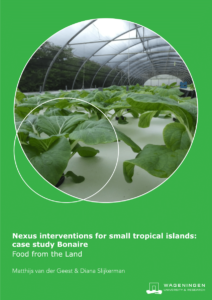Like most small tropical islands, Bonaire is largely dependent on imported food. This results in high food prices due to import taxes and transport costs, and high vulnerability towards price fluctuations and global developments, which both present major risks to food security. With many inhabitants living on or below the poverty line, low incomes translate into eating cheap unhealthy food, often causing health issues.
While 25% of Bonaire’s surface consists of rural areas suitable for on- land food production, current practices of agriculture are small scale, mainly due to small domestic markets and limited access to freshwater, electricity, human capacity and know-how, while the widely used practice of extensive husbandry results in suboptimal yield and severe grazing- induced erosion issues. Sustainable development of agriculture and husbandry on Bonaire thus provides a great opportunity to increase food security, but requires a holistic (nexus) approach that accounts for the local socio-economic setting and the interlinkages between the water, food, energy and ecosystem domains, to identify trade-offs and seek for synergies among these domains.
Several nexus interventions are presented that will aid sustainable development of the agricultural and livestock sector, while simultaneously contributing to water, energy, ecosystem and nutrition security. Identified key nexus interventions are: strong policy aimed at facilitation of fenced livestock keeping, water-saving agriculture, decentralized solar power, development of an agro-business and knowledge centre, and development of educational programmes on sustainable agriculture and healthy diet.
Introduction
Food security and nutrition is a known challenge for many small tropical islands. On small tropical islands, local food production is often constrained by the arid climate, limited availability of resources (e.g. fertile land, freshwater) and infrastructure (e.g. inadequate ports, roads, storage facilities), small domestic markets, geographical remoteness resulting in very high logistic costs that undermine export led development, and the dominance of other economic sectors, most notable tourism. As such, small tropical islands typically depend on import for their food supply, and Bonaire is no exception. Although this dependence on imported food provides some form of food security, it also creates numerous problems with regard to food security. These problems include relatively high food prices due to import taxes and high transport costs, high vulnerability towards price fluctuations and global developments, significant levels of food loss and waste, environmental and natural resource degradation, and growing malnutrition and public health costs due to the emergence of and preference for more energy dense and convenient processed foods (FAO 2017).
The complete report: https://www.researchgate.net/Food_from_the_Land_
Wageningen University 2019

